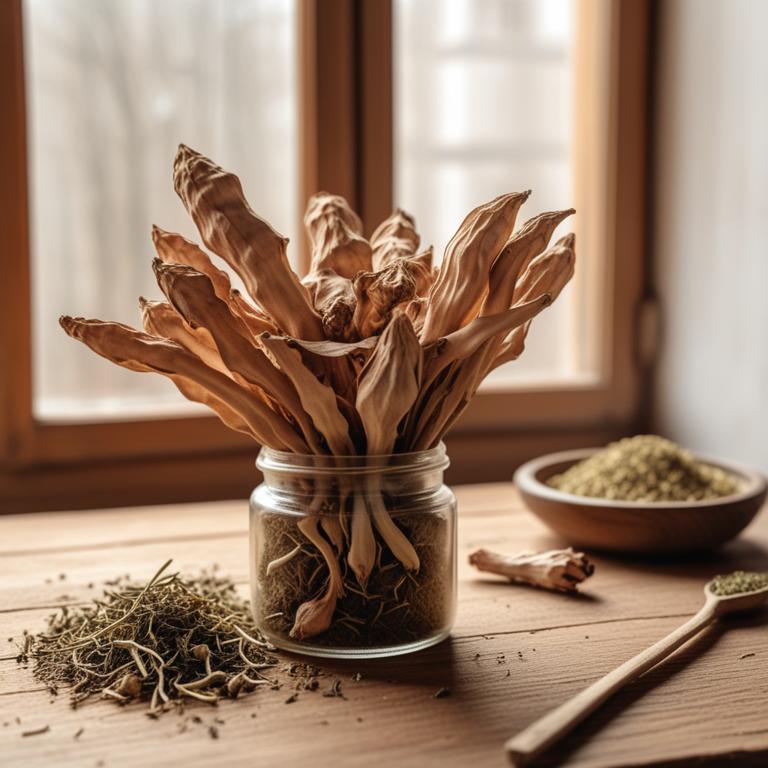Updated: Dec 1, 2024
Constipation Prevention and Treatment with Herbal Preparations

Constipation is when you have trouble passing stool or it's hard to go to the bathroom.
It can make you feel uncomfortable, bloated, and even painful. It can also affect your daily life, making you feel sluggish and tired. So, what causes constipation?. Sometimes it's because you don't eat enough fiber-rich foods, or you don't drink enough water. Stress and certain medications can also make it harder to have regular bowel movements. Fortunately, there are some herbs that can help.
Senna is a natural laxative that can stimulate your digestive system and get things moving. Dandelion root is another herb that can help regulate bowel movements and ease discomfort. Psyllium is a fiber-rich herb that can help soften stool and make it easier to pass. These herbs can be used to make teas, capsules, or even tinctures. Drinking a warm tea made from senna or dandelion root can be soothing and help ease constipation. You can also take psyllium capsules as a supplement to your diet.
Some herbal laxatives come in the form of gummies or chewables, which can be a tasty way to get relief.
Table of Contents
- What factors lead to constipation?
- What are the benefits of using herbs to prevent and treat constipation?
- What are the main medicinal herbs commonly used to alleviate constipation?
- What herbal remedies have the highest usage for constipation?
- Which herbs may exacerbate constipation, and should be avoided?
- FAQ
What factors lead to constipation?
The main causes of constipation are often related to changes in our digestive habits, diet, and overall health.
Dehydration is a common cause of constipation, as when our body doesn't have enough water, the stool can become harder and more difficult to pass. Low fiber intake is another significant factor, as fiber helps move food through the digestive system and keeps bowel movements regular.
When we don't consume enough fiber-rich foods, like fruits, vegetables, and whole grains, our body struggles to pass stool. Irritable Bowel Syndrome (IBS) can also lead to constipation, as it affects the muscles in the intestines and slows down bowel movements. Diabetes is another potential cause, as high blood sugar levels can damage the nerves that control bowel movements, leading to constipation.
Hypothyroidism, a condition where the thyroid gland doesn't produce enough hormones, can also cause constipation, as the hormones regulate digestion and bowel movements, and a deficiency can disrupt this process, leading to harder, drier stools that are difficult to pass.
What are the benefits of using herbs to prevent and treat constipation?
Using herbs for constipation can be really helpful.
They work in several ways to get things moving again. Some herbs help relax the muscles in the digestive tract, so they don't squeeze too hard and block food from passing through. Others help stimulate the muscles to contract and push food through the digestive system.
Some herbs have anti-inflammatory properties, which can reduce swelling and irritation in the digestive tract, making it easier for food to pass through. Some herbs also help increase the amount of water in the stool, making it softer and easier to pass. Additionally, some herbs can help calm the nervous system, which can help reduce stress and anxiety that can contribute to constipation.
This can make it easier to have regular bowel movements and feel more comfortable.
What are the main medicinal herbs commonly used to alleviate constipation?

Herbs can be a great natural way to help with constipation.
One of the most effective herbs is Licorice root, or Glycyrrhiza glabra, which helps relax the muscles in the digestive tract and makes it easier to pass stool. Another herb is Chasteberry, or Castanea sativa, which is high in fiber and helps move food through the digestive system more quickly. Fennel, or Foeniculum vulgare, is a natural laxative that helps stimulate bowel movements and reduce bloating. Its active compounds also help soothe the digestive system and reduce inflammation.
Ginger, or Zingiber officinale, is another herb that can help with constipation. It helps stimulate digestion and relieve nausea, making it easier to pass stool. Magnolia bark, or Magnolia officinalis, has anti-inflammatory properties that can help reduce inflammation in the digestive tract, making it easier for food to pass through. These herbs work in different ways to help relieve constipation, but they all have one thing in common: they're gentle and natural, making them a great alternative to harsh medications. They can be used on their own or in combination with other herbs to create a natural remedy for constipation.
When used correctly, these herbs can help get your digestive system moving again and keep you regular.
What herbal remedies have the highest usage for constipation?

Herbal preparations can be very helpful in treating constipation.
One way to use herbs is by drinking tea made from them. For example, senna tea is a popular choice for constipation because it contains compounds that help move stool through the digestive system. Another way to take herbal remedies is by swallowing capsules that contain dried herbs. These capsules are easy to digest and can be taken with water. Peppermint capsules, for instance, can relax the muscles in the digestive tract and improve bowel movements. A decoction is a strong liquid made by boiling herbs in water. It can be more effective than tea because the boiling process extracts more of the active compounds from the herbs.
Dandelion decoction, for example, can help stimulate bowel movements and relieve constipation. Herbal tinctures are liquid extracts of herbs that can be taken in small doses. They are often more concentrated than teas or decoctions, and some people prefer them because they are easier to store and transport. Ginger tincture, for instance, can help reduce inflammation in the digestive tract and promote bowel movements. Finally, suppositories are solid forms of herbal remedies that are inserted into the rectum. They are often used to treat constipation because they can directly stimulate the muscles in the rectum and help move stool. Psyllium suppositories, for example, can help draw water into the stool and make it easier to pass. Each of these herbal preparations has its own unique benefits and can be used to help treat constipation.
By choosing the right preparation and herb, people can find a treatment that works for them.
Additional Resources:
Which herbs may exacerbate constipation, and should be avoided?
If you have constipation, it's best to be careful with certain herbs that might make it worse.
Cinchona officinalis, also known as fever tree, contains compounds that can slow down digestion and worsen constipation. Astragalus membranaceus, or Huang Qi, might seem like a harmless herb, but it can actually decrease gut motility, which means it can slow down bowel movements and make constipation worse.
Digitalis purpurea, commonly known as foxglove, is primarily used to treat heart conditions, but it can also cause constipation and diarrhea at the same time, and in people with pre-existing constipation, it's likely to make things worse. Rauvolfia serpentina, or snakeroot, is often used to treat anxiety and high blood pressure, but it can also cause constipation, nausea, and vomiting, which can be uncomfortable and even painful.
Ephedra sinica, or Ma Huang, is known for its stimulating effects, but it can also cause dehydration, electrolyte imbalance, and constipation, especially if you don't drink enough water.
FAQ
Are there any specific herbs that can prevent constipation?
Some herbs like psyllium and senna can help with constipation.
Psyllium softens stool and makes it easier to pass, while senna stimulates the bowel to move waste. These herbs have been used for centuries to help with digestion.
They work by changing the way the body processes food and waste.
Is it safe to use herbal remedies for constipation during pregnancy?
When it comes to constipation during pregnancy, some women turn to herbal remedies for relief.
However, it's essential to be cautious with these products. Some herbs, like senna, can stimulate bowel movements but might also cause uterine contractions, which isn't safe during pregnancy.
Always check the ingredient label carefully.
Are there any herbs that can reduce the frequency of constipation?
Some herbs may help reduce constipation.
Ginger, for example, can help stimulate digestion and move food through the digestive system. Peppermint oil has a calming effect on the muscles in the digestive tract, which can help food pass through more easily.
These herbs can be consumed as tea or added to food.
Related Articles

Understanding Gastritis: Causes and Natural Relief with Medicinal Herbs

Causes and Herbal Preparations of Viral Hepatitis: A Comprehensive Guide

Stomach Growling: Understanding Causes, Prevention, and Herbal Remedies

Queasy Stomach Causes and Herbal Remedies: A Comprehensive Guide

Vomiting: Understanding the Causes and Natural Remedies with Medicinal Herbs and Herbal Preparations






